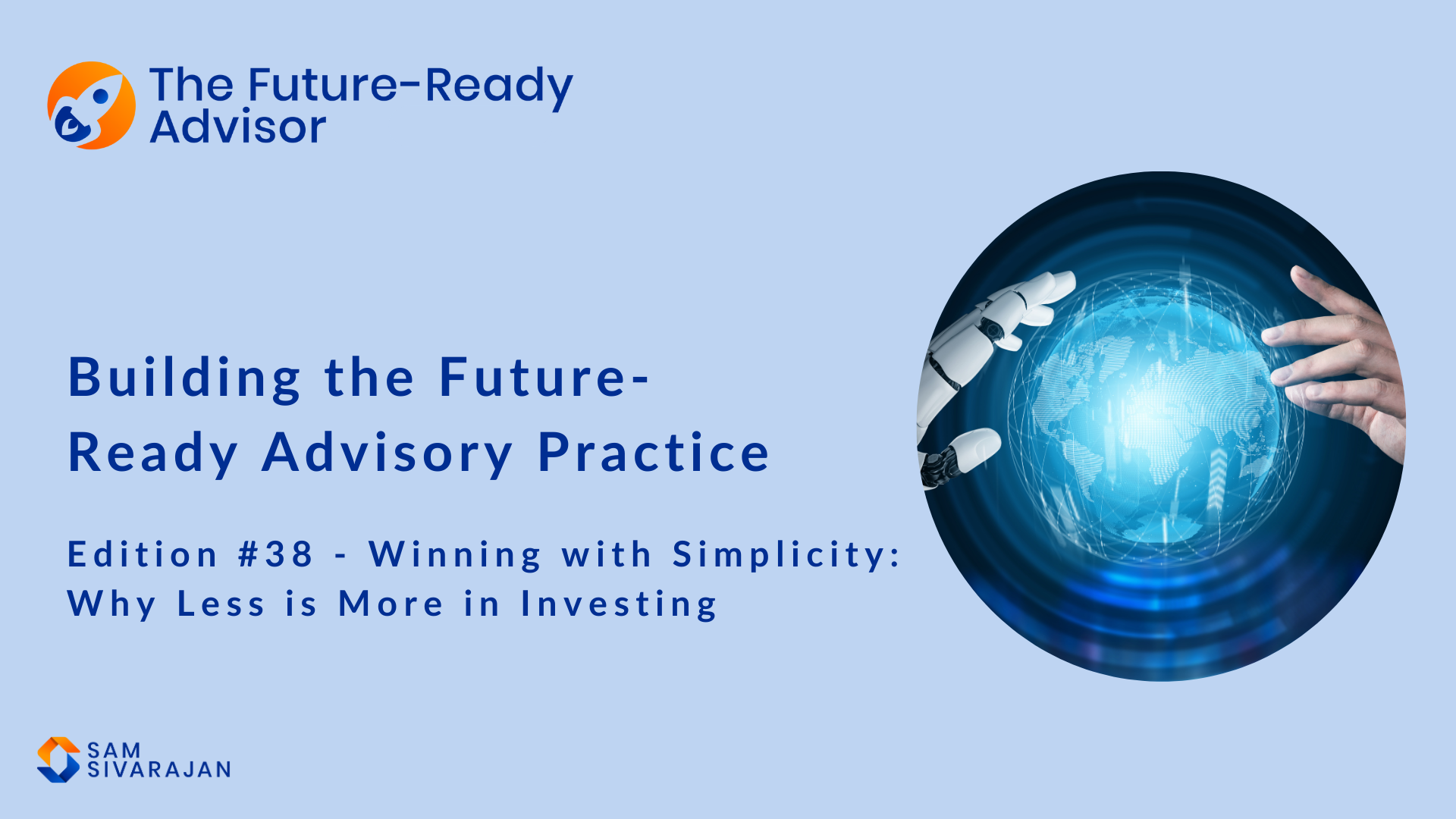Welcome to the 38th edition of #theFutureReadyAdvisor Newsletter!
Subscribe & join the conversation. Share comments and feedback.
Estimated reading time: 5 minutes
In finance and investing, the allure of complexity is strong. We often believe that sophisticated strategies yield superior results. However, simplicity, consistently applied, often outperforms complex approaches. Let’s explore why this is true and how you can benefit from keeping things simple.
The Power of Consistent Simplicity
A story from Howard Marks’ memo highlights the power of simplicity and consistency. David VanBenschoten, who managed the General Mills pension fund, never ranked above the 27th percentile or below the 47th percentile in annual returns over 14 years. Yet, his fund ended up in the fourth percentile overall for that period. This impressive result was achieved not by aiming for top performance every year but by avoiding large losses and maintaining steady, above-average returns.
The Tale of the CPPIB
The Canada Pension Plan Investment Board (CPPIB) offers a cautionary tale about the dangers of complexity. Andrew Coyne reports that since 2006, the CPPIB shifted from a simple, low-cost index-based strategy to a complex, actively managed approach. This change led to significant increases in staffing levels, from roughly 150 employees in 2006 to over 2,100 today, and a near hundredfold increase in costs, from $36 million in 2006 to $3.5 billion in 2024. Despite these increased efforts and expenses, the CPPIB’s performance lagged behind a simple, passive investment strategy.
Over an 18-year period, the CPPIB’s active management strategy resulted in a negative annualized return of 0.1% relative to its benchmark, equating to a $42.7 billion loss. While the fund achieved a 7.7% annual return, the reference portfolio—a composite of global equity and bond indexes—earned 7.8% annually. This stark underperformance highlights how complexity can introduce unnecessary costs and risks that often outweigh any potential benefits.
Coyne emphasizes that the CPPIB’s experience is not unique. Many actively managed funds underperform their benchmarks, especially after fees are included. The CPPIB’s transformation into a “giant hedge fund” involved picking stocks, taking seats on boards, and investing in a mix of esoteric assets like real estate and private equity. These efforts not only failed to deliver better returns but also significantly increased the fund’s operational complexity and costs.
Simplicity in Theory and Practice
The Pareto Principle, or the 80/20 rule, asserts that 80% of outcomes result from 20% of inputs. This principle is evident in investing, where focusing on core factors—such as consistent contributions, low costs, and diversification—can achieve most investment goals. Morgan Housel, in his book “The Psychology of Money,” advocates for simple, clear investment strategies over complex approaches.
Research supports the superiority of simple strategies. Mauboussin and Callahan’s “Measuring the Moat” highlights that focusing on core competitive advantages, rather than pursuing complex strategies, leads to sustainable value creation. Additionally, research by Victor De Miguel and colleagues demonstrates that a simple equal-weighted portfolio (the 1/n rule) often outperforms more complex strategies based on mean-variance optimization, an approach even used by Harry Markowitz, the father of modern portfolio theory.
In perhaps a somewhat ironic indictment, Harry Markowitz confessed to not following his own advice on portfolio construction. In an interview, Markowitz talked about his investing strategy for his retirement account [Nocera, J., (2007, September 29), Can we turn off our emotions when investing?, The New York Times, retrieved April 21, 2018 from newspaper homepage]:
I should have computed the historical co-variances of the asset classes and drawn an efficient frontier [but] I visualized my grief if the stock market went way up and I wasn’t in it — or if it went way down and I was completely in it. So I split my contributions 50/50 between stocks and bonds.
Similarly, Karl Weick’s analysis of the Pittsburgh Steelers in the 1970s underscores this point. The Steelers won 98% of their games against losing teams with a simple game plan, but their success rate dropped to 50% against winning teams, where more complex strategies were needed. This illustrates that consistently executing a straightforward plan can lead to extraordinary success in most situations.
Key Takeaways for Financial Advisors
- Consistency Over Complexity: The story of David VanBenschoten at General Mills illustrates that consistent, moderate performance can lead to exceptional long-term results. By avoiding the pursuit of top performance every year and focusing instead on steady, above-average returns, investors can achieve superior outcomes.
- Complexity Can Erode Gains: The experience of the Canada Pension Plan Investment Board (CPPIB) demonstrates how complex, actively managed strategies often underperform simpler, passive strategies. The shift from a low-cost, index-based approach to a complex, actively managed strategy led to significant increases in costs and operational complexity, ultimately resulting in underperformance relative to the benchmark.
- Simplicity Drives Success: The Pareto Principle and research by Mauboussin and Callahan highlight that focusing on core competitive advantages and simple strategies can lead to sustainable value creation. Simple, clear investment strategies often outperform more complex approaches, as evidenced by the success of equal-weighted portfolios over those based on mean-variance optimization.
- Behavioral Insights: Engaging both the rational and emotional aspects of clients’ decision-making processes can enhance investment outcomes. Simple strategies not only align well with long-term goals but also help clients stay the course during market fluctuations, avoiding the pitfalls of chasing returns or reacting to short-term market movements.o.
In investing, simplicity often triumphs over complexity. The experiences of the General Mills pension fund and the CPPIB, supported by academic research and real-world examples, highlight the value of straightforward strategies. By focusing on core factors and maintaining a disciplined approach, investors and advisors can achieve significant long-term success.
If you enjoyed reading this edition of The Goals-Based Advisor newsletter, please invite your friends and colleagues to subscribe and join over 1000 other subscribers. If you have any feedback or topic suggestions, please drop me a note on LinkedIn.
When you are ready, direct message me and I can help you with:
- Speaking engagements & Workshops for your team and clientele
- Tailored, high-impact Consulting and Coaching Services for your practice


